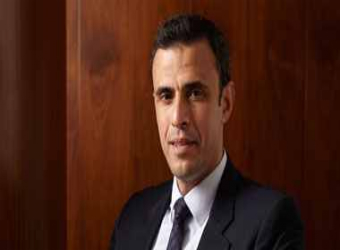Egypt will continue to be a very crucial market for the Arab and foreign investors, despite the unclear yet main features of the upcoming phase, EFG Hermes’ co-chief executive officer Karim Awad said on Monday.
This comes by virtue of the fact that Egypt’s economy enjoys multiple alluring potentials in both medium and long terms, Awad explained to reporters on the sidelines of EFG-Hermes One on One Conference in Dubai
Moreover, EFG-Hermes’ executive has referred to some structural challenges crippling Egypt’s economy, which in return triggered foreign investors’ dire need to know the government’s plans to untie the Gordian knots, notably the subsidy programs, energy prices and structure of petroleum subsidies. These three knots have significant impact on the state’s budget deficit and domestic debt.
For the energy prices, Awad stated that the investors need more explanations as regards to whether the country would import natural gas or not.
Meanwhile, Awad has expressed his optimism about Egypt’s economic future in the medium and long terms, saying the new government led by Eng. Ibrahim Mehleb includes remarkable economic profiles. Within the next six months, Egypt will witness a landmark leap, he added.
Adopting urgent solutions to the economy’s structural knots such as exchange rates and domestic debt will stimulate the movement of direct investments in Egypt.
Commenting on the Egyptian Exchange (EGX)’s performance during the last 9 months, Awad said it is on the right track reflecting an upbeat sentiment among traders backed by higher liquidity injected by governmental and individual funds.
In the same vein, EFG-Hermes’ official has hailed the recent amendments to the regulations governing the Egyptian market. Awad said since holding his office as the chairman of the Egyptian Financial Supervisory Authority (EFSA saying the) in August 2013, Sherif Samy has entered vital changes yet they have not come into effect yet in the market.
Furthermore, Awad highlighted other financial instruments such as the mortgage finance funds which are likely to play a substantial role in alluring more investments to Egypt’s market and boosting the real estate growth rates within the upcoming period.
He also talked about the exchange-traded funds (ETFs) saying they are key tools to develop the market. Accordingly, EFG-Hermes will be study the activation of its ETFs prospectus within the upcoming period just after the market regulator announces the governing regulations for such funds.
As regards to the businesses of EFG Hermes, Egypt’s largest investment bank, Awad said the Group wants to secure 60 % of its investment banking revenue from abroad by 2017.
The bank, which has operations across the Middle East, wants a better revenue balance, he explained.
Currently 60 % of investment banking revenue comes from Egypt and 40 % from abroad, but EFG wants to flip that round to 60 % from overseas, he said.
“Egypt will continue to be a very crucial market for EFG Hermes but we want to make sure we have good operations in the United Arab Emirates, Saudi Arabia, Kuwait and other markets,” Awad noted.
“The target is to become a more balanced regional bank that operates across all markets, with Egypt remaining the largest contributor,” he said, adding the bank was targeting growth in its asset management business, with its core brokerage operations also pushing it towards the overseas revenue target.
Awad said EFG’s mergers and acquisitions advisory pipeline was currently strongest in Saudi Arabia, with deals both inside the country and outbound transactions into other Middle East nations being worked on.
The CEO of the leading investment bank in the Arab world also said the Group owns the biggest body of fund and portfolio management, with managed assets of more than $3.1 billion; $87 million worth of Saudi investments, $1976 million Egyptian investments and $1006 million UAE investments.
EFG-Hermes is focusing on mergers and acquisitions as well as private placements in Saudi Arabia and the United Arab Emirates. The investment bank is also “closing” a private placement for a food and beverage company in Abu Dhabi, the capital of the U.A.E., he said.
“The entire investment bank is going to turn a corner in 2014,” according to Awad.
Meanwhile, he elaborated that EFG has a “robust” pipeline for initial public offerings in Egypt as the stock market rallies.
“We have a number of IPOs that we are currently pitching and others that we have been mandated,” Awad said in an interview in Dubai yesterday.
The IPO would be the first in Egypt since the 2011 uprising that ended Hosni Mubarak’s three-decade autocratic rule. The revolt was followed by political turmoil that prompted the army to remove Mubarak’s successor, Islamist President Mohamed Morsi, from power in July.
Elsewhere, EFG-Hermes’s private equity division said last week it sold its 19 percent stake in jewelry retailer Damas International Ltd. to Qatar’s Mannai Corp. QSC for $150 million, almost doubling the investment made in May 2012.
Awad said EFG-Hermes is also set to meet its plan to cut operating expenses to 500 million Egyptian pounds ($71.8 million) this year. The target was announced after a merger with Qatar’s QInvest LLC collapsed in May. EFG-Hermes at the time estimated 2013 expenses at 780 million pounds.
EFG-Hermes reduced jobs and sold some assets to meet the target. While the company is “not really in a strong hiring mode,” Awad said he sees no need to cut more jobs.
Finally, Awad was asked about his outlook for 2014, he answered:
“In terms of revenue growth…we are fairly optimistic. If the markets continue the way they are today we’ll have a good year.”


